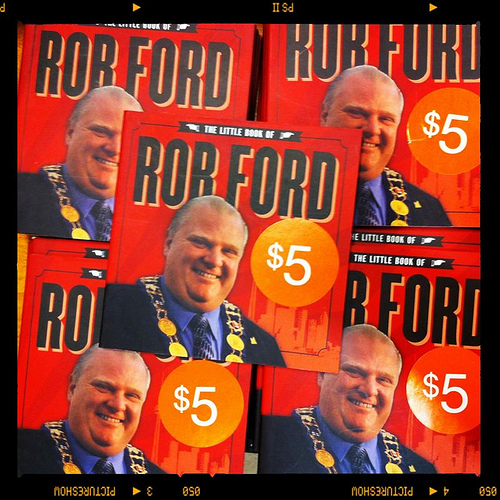I already feel nostalgic for the Rob Ford era in Toronto politics. It was a missed opportunity. A teachable moment that existed too briefly.
It’s not mainly democracy I’ll grieve for, though the mayor’s fate was taken out of the hands of voters. Our system isn’t all that democratic anyway. Money talks in elections, winners usually don’t even get a majority. But if you think of democracy or politics in a larger sense, this was a chance to learn how to live with harsh conflicts and aggressive personalities yet achieve real progress.
People who were disheartened by Ford’s win gradually found a way to make their points. Unlikely leaders on civic issues emerged, like Margaret Atwood. The anti-Fordists on council allied with others, including Fordists, and forged policies together. Ford loyalists had the space to occasionally declare some autonomy. His weakness and ineptitude enabled them. With a mayor in clearer command, his allies are more likely to just strike poses and mimic his rhetoric.
It’s Ford’s loyal foot soldiers I feel for the most. He was a classic populist — a term that generations of academics have lived off without ever adequately defining. But it’s always based on resentment of “the elites,” a favourite Fordite term. It doesn’t refer to real economic and political powers; it’s directed at those with better access to vocabulary, education, professional expertise and connections. When a Caribbean immigrant was asked why he’d support Ford in a new election, he said: “Because he’s for the people.” It’s that un/clear.
But the disdain and disrespect felt by many Ford voters is utterly real, I’m convinced. Anti-Ford voters routinely use the term “stupid” about them. You don’t hear that going in the reverse direction; the rebuttal epithet is “elites.” For an offbeat parallel, check the recent letters columns in the London Review of Books, a highly literate, left-wing, undeniably elitist magazine to which I subscribe. When a U.S. Tea Party-member-cum-reader dared to argue with an article attacking her leaders, letters flowed in that were vituperative, dismissive and questioned why a Tea Party member would even read their precious journal.
The Ford moment was a chance to try and heal that rift by arguing case-by-case regarding the public good, rather than dissing people for their general views. Perhaps some Ford voters were already re-evaluating on their own, based on the dumbfounding behaviour of their hero and a chance to view concrete results. We might have seen some positive evolution on all sides.
This matters since leaders routinely disappoint even their fervent backers. When I think about people I had high hopes for — premier Bob Rae, mayor David Miller, President Barack Obama — and how they generally backtracked or misled in office, I’d say making a little progress toward a more respectful and harmonious society which can argue civilly about issues is probably worth more than who wins or loses. All that became mere fantasizing once it was decided to go the courtroom route, and in light of the judge’s decision to void the voters’ choice for mayor.
Did the judge have any alternative? Of course he did. Almost no one expected this result in advance. Besides, judges have their own predilections, we’re all from a common species. Often they’re just hoping lawyers will give them reasons to justify what they want to do anyway.
So should Rob Ford have got away with breaking the law? No, but other punishments would’ve fit better. Fines, reprimands — he could have been put in the stocks in Nathan Phillips Square for awhile. You could probably borrow some from Upper Canada Village, especially in winter. It would’ve made more sense than using them on adulterers in the 17th century. Public humiliation for abusing public trust. He would’ve stayed mayor but got his due, while the people’s right to choose their leaders would remain intact. It would have been Solomonic.
In the silver linings department: if there’s a by-election for mayor, it could be a vigorous one, since the context has been building for two years, and it’s been precipitated by a dramatic event. But I still prefer the politics that happen between elections — which almost inevitably become horse races or beauty contests.
This article was first published in the Toronto Star.
Photo: Francis Mariani/Flickr



